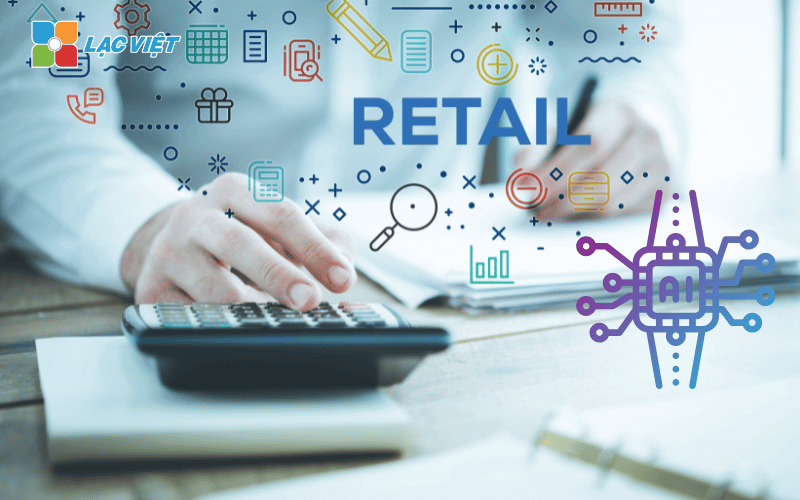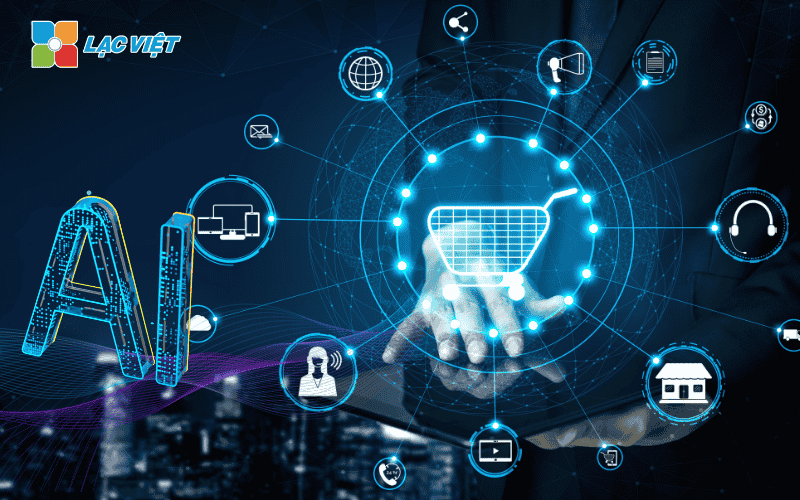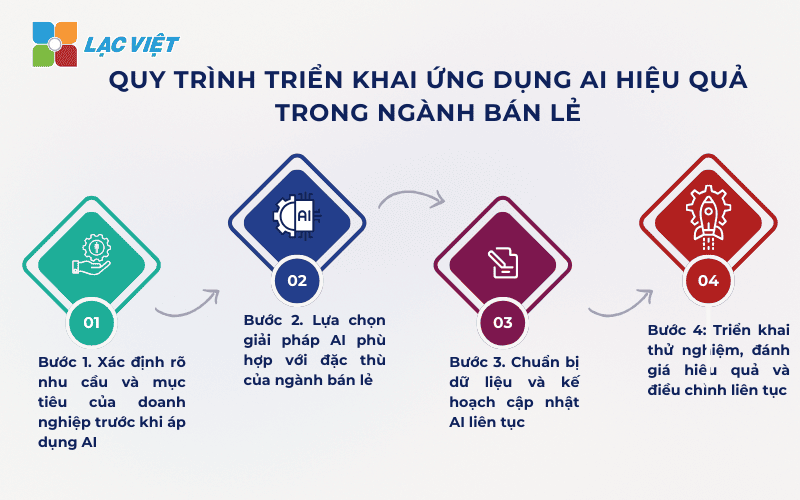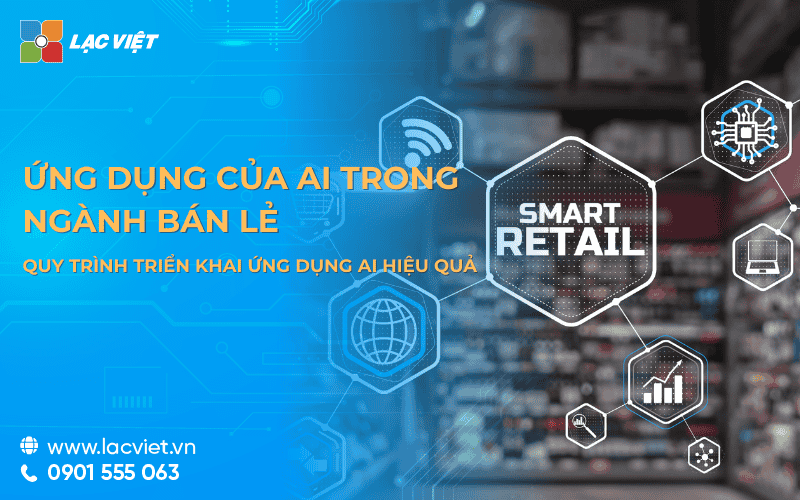Consumers today do not only require quality products with competitive prices, but also the desire to be the best shopping experience convenient, fast and personalization according to their needs. To efficiently meet these demands, the application AI in the retail industry is becoming the solution is many businesses choose, prove to be superior effectiveness.
In this article Lac Viet will help businesses learn more about the application of AI in the retail industrybenefits the fact that the business has received, how to your business can also successfully applied this solution to increase competitive advantage and optimal business performance in the future.
Competitive landscape increasingly scathing of the retail industry today
In recent years, the retail industry is witnessing the fierce competition in both traditional channels and online. The explosion of e-commerce to help customers to easily compare products, prices and quality of services between businesses. According to market report 2024 from McKinsey, more than 80% of consumers search for information online before making a purchase, found shopping behavior increasingly smarter.

Before this pressure, retail businesses need to constantly innovate to improve the shopping experience, attract and retain consumers. The key factor which determines the success lies in the ability to understand customer feedback quickly, personalization, products, services. So how to meet increasing expectations this in the most efficient way?
1. Why retail businesses increasingly focus on application of artificial intelligence (AI)?
To solve the above challenges, many retail businesses are looking for solutions to modern technology, especially apps artificial intelligence (AI). AI brings the superior value, which helps business to quickly adapt to market and better meet customer expectations.
First of all, AI help businesses analyze and understand the behavior, preferences, shopping habits of customers in an automated way. Through the tool, AI, businesses can accurately predict customer needs, thereby making the proposed product or service to suit each individual. For example, if a regular customer to buy products of health care, AI will automatically recommend the same products or supplements, to help customers save time searching, increases business opportunities to sell more goods.
Besides, AI also help businesses significantly improve the speed and quality of service customer care. Tools like chatbot AI can, 24/7 customer support, quick reply the common questions that do not need direct involvement of employees. Help customers more satisfied and make a good impression on the brand of the business.

Finally, the application AI in the retail industry also help to optimize operating costs, supply chain management, warehouse more efficient. AI can forecast the exact amount of necessary goods, reduce excess or shortage of inventory, help business save cost.
Because of the practical benefits and value of this application AI is gradually become the inevitable trend in the retail industry, helping businesses create competitive advantage, revenue growth, meet better the needs of the modern customer.
2. Application of AI in the retail industry what is?
Artificial intelligence (AI) understand in a simple way is technology that allows a computer or software to perform the work like humans, for example, analyze data, predict trends, or interact with customers in a natural way.
When referring to “application of AI in the retail industry”, we are talking about that tool use AI to improve sales effectiveness, optimal customer experience for retail business.
More specifically, the application of AI in the retail sector can include activities such as chatbot, customer consulting automatic, data analysis, customer behavior to give suggestions most suitable products, inventory management, supply chain efficiency, or predict the trend of shopping in the future.
Practical examples, easy to understand, especially when access the web and e-commerce as Tiki, Shopee or Lazada, you will see immediately what products are hints dedicated to you, based on your viewing history and purchase of your previous. This is the end result from the application AI to automatically analyze the shopping preferences of each customer, which helps consumers have shopping experience quick, more convenient.
Thus, one can see the application of AI not only helps retail businesses increase revenue but also create long-term value through enhancing customer experience effectively and personalize the most.
3. The application AI in the retail sector, the most prominent 2025
3.1. Optimal management supply chain by AI
In the retail sector, supply chain plays vital role, directly affect the ability to meet customer demand and financial performance. AI is comprehensive changes to the way businesses supply chain management:
- Demand forecast accuracy:Instead of relying on experience or past data merely, AI analysis combining multiple data sources: historical sales, market trends, weather factors, social events (new year, festival, Black Friday...), even social network data. Thanks to that, the business can predict the demand at each time, each region, each group of customers. This helps to minimize the shortage of goods, or inventory, big capital is alarming problems in retail.
- Optimal inventory: AI has the ability to automatically make recommendations to enter orders, transfer orders between warehouses and stores in real-time. For example: if a store signs coming out the top selling items, the AI system will give a warning propose rotated from the central warehouse or from another store to help minimize the costs of storage, just increase the effective customer service.
- Optimal logistics: AI supports the design, delivery route optimization based on traffic, distance, fuel cost, even weather conditions. Retail businesses can save millions of DOLLARS per year thanks to reduced transport costs, limiting the car running empty, shorten the delivery time. In addition, AI also helps to plan maintenance equipment, trucks according to the sensor data, avoiding disruption of the supply chain.
Retail business just optimal operating costs, while ensuring goods are always ready to serve customer from that increase satisfaction, the ability to retain consumers.
3.2. Customer experience personalization by AI
In the context of consumers increasingly demanding fast service tailored to the individual needs, AI become the core tool to the retail business, construction experience, personalize comprehensive.
- AI product suggestions intelligence: AI analysis of shopping behavior, transaction history, products viewed, cart neglected to take out product suggestions tailored to each individual. For example: a customer just bought the phone, the AI system can propose headphones, paneled back or pack extended warranty. This does not only increase conversion rate but also raise the value of orders average.
- Chatbot 24/7 customer care: Chatbot AI today is no longer just stopped in answer basic questions, which have the ability to handle complex requirements such as lookup, orders, product advice, receive complaints even supports refund. With the ability to continuously learn, chatbot help reduce the workload for staff, while ensuring our customers are always served immediately, even outside office hours.
- Marketing personalization: AI, data analysis, behavior, demographics, shopping habits to group customers exactly. From there, businesses can deploy the marketing campaign goals: product suggestions via email, personalization banner on our website, or give preferences individually for each client. The result is business not only improves the response rate, but also building the loyalty of customers in the long term.
Personalize user experience with AI not only help increase sales but also to create the mount feelings between the customer and the brand – an important factor in the competitive retail today.
3.3. Price management, promotion and smart AI
In the retail industry, strategy price and promotion decisions directly to revenue and profit. Ago, most businesses apply a price adjustment based on experience or track opponents, resulting reaction was slow inaccurate. With AI, the picture completely changes:
- Dynamic pricing (Dynamic Pricing)
AI constantly analyzes data from many sources: the market demand, the price level of the opponent, the trend of online search, the time of day or season, even the weather. From there, the hint system or automatically adjust product prices in real time.
For example: in high season shopping Festival, AI can forecast items, beer, soft drinks will increase power needs and automatically increase the selling price just enough to the optimal profit but still keep competitive. In the afternoon, on the contrary, the products upcoming end of life can be a quick discount to release inventory.
- Promotion optimization (Promotion Optimization)
Instead of applying the promotion masse, AI predict the impact of each form of promotion (discount %, bonus products, buy 1 get 1, etc.) for each group of customers different. Through the analysis of historical transactions, shopping behavior, the system may specify the preferred form most effective for each group.
For example: group of loyal customers can be gift voucher for birthday instead of deep discounts, while the new guests staying consistent with preferential “try it first”. Thus, medium business increase sales, just preserve profit margins.
ANYONE help retail business valuation more accurately, create promotion is key, from which maximize profit without depleting brand image.
3.4. Store management and shopping experience by AI
Shop space modern retail is gradually becoming the “shop smart” thanks to AI technology. This app not only improve operational efficiency but also create a different experience for the customer:
- Face recognition, behavior analysis customer: AI integrated with cameras in the store to count the number of guests, age range, gender, and even analyze any area guests stop longer. Business from which it can be optimal layout product, adjust the lighting, advertising to increase the rate of purchase. In addition, behavioral data to help forecast trends, adjust inventory accordingly.
- Automatic payment (Checkout-free): One of the big step is the payment model no cashier as Amazon Go. AI combine computer vision, sensors and machine learning to identify products customers get automatically except for when they left the store. This form helps remove queue, enhance the shopping experience, “quick – add”, at the same time reduce the cost of personnel at the cashier.
- Personnel management, work shift: AI forecast passenger traffic according to frame, hour, day, or peak season for business to arrange work shifts reasonable for the employee. Instead of relying on predictions craft, the AI system helps to allocate personnel, scientific avoid a shortage of people at peak hours or in low hours. This not only saves personnel costs but also ensure the quality of service is always stable.
ONE popular retailer from where the transaction tradition of space experience smart convenient, more attractive to customers, at the same time optimal operating costs for the business.
3.5. Data analysis & decision making by AI
In the context of multichannel retail (online – offline), customer data increasingly rich but well dispersed. AI became a strategic tool to help businesses transform data into knowledge to serve the decision.
- Predict market trends
AI has the ability to handle huge data from multiple sources: social networks, news, online search history, sales and even external factors such as weather, big event. Instead of just relying on reported sales the past, AI early detection of emerging trends – for example an increase in the demand for organic food, sustainable fashion, or equipment, green technology.
The retailer, which can adjust the category, product, marketing campaign or plan to enter time, avoid miss an opportunity to reduce the risk of inventory obsolescence.
- Analyze customer behavior, multi-channel
Today's customers are often exposed to the brand through multiple channels: website, app, social network, physical store, hotline. AI helps the most discrete data this portrait comprehensive customer (Customer 360 view).
For example, a customer can often see products on the app, but buy directly at the store. AI will analyze the behavior that determine the latent demand, the proposed approach is suitable as send the voucher on the app or suggestions for additional products when they visit the store.
Thanks to a multi-dimensional view of this, the decisions about marketing, product management or customer service are accurate and needs more.
Business retail capacity forecasts, reduce risk when making decisions, at the same time capture quickly the business opportunity in market volatility.
3.6. Anti-fraud and security by AI
In retail environments, modern, especially e-commerce, fraud, security risks are increasing. AI plays the role frontline in preventing risks, protect assets and corporate reputation.
- Detect unusual transactions
AI applies machine learning to analyze millions of transactions in real time, from which detects unusual behavior such as transactions from unfamiliar IP address, purchase many products have high value in a short time or use your credit card unlike previous history. The system can automatically flag warning or blocking the transaction, which helps to minimize losses due to fraud.
For example: a customer has ever shopping retail, but suddenly payment series electronic order value by international card – AI will alert staff to check.
- Surveillance smart camera in store
In physical stores, AI in conjunction with surveillance cameras to identify suspicious behavior such as unusual moves around the shelves, hide products, or coordinating group to steal. Don't just stop at detection, AI can also send instant alerts to security staff or the manager.
In addition, detection technology, face detection, customer or employee has a history of fraud, from which prevent risks right from the start.
Values bring: Business minimize loss of goods and to protect customers, staff, at the same time reinforce the belief in retail systems, safe transparent.
3.7 ANYONE looking for smart products
Electronic commerce (e-COMMERCE) is now channel significant growth of most retail businesses. However, e-COMMERCE also comes with challenges: the data volume is huge, requires seamless experience and the trust of customers. AI exactly is strategic tool to enhance management efficiency, increase customer experience in e-COMMERCE.
How it works: Instead of just typing keywords, customers can download product images (for example a dress taken from Instagram) to AI systems analyze images, collated with data warehouse returns the similar products available on the website/app e-COMMERCE.
Benefits:
- Help customers save time finding, especially in the fashion industry, interior, cosmetics – where images play a decisive role.
- Reduce the rate of customers leaving due to “cannot find the desired product”.
- Businesses are adding cross-selling opportunities (cross-sell) by proposing the products of the same style, or accessories.
In addition to search by image, AI also supports semantic search, understand the intentions of the client, not just based on keyword. For example: when customers search for “jacket backpack waterproof”, the system will suggest the correct products fit instead of just showing the “jacket” general.
3.8 AI helps manage product reviews (Review Management)
- Filter detected spam: AI automatically detects the fake reviews, repeat or signs of unusual (for spam review), help system, transparent reviews more reliable.
- Emotion analysis (Sentiment Analysis): Instead of just counting the number of stars, AI content analysis reviews to determine the real emotions of clients – positive, negative, or neutral. For example, a rating of “beauty products but slow delivery” will be AI identified as positive reviews about the product but negative on logistics services.
- Giving insight for business: Businesses can quickly grasp the strengths and weaknesses according to the perspective customers. If a lot of negative feedback revolves around “slow delivery”, it is a signal to businesses to optimize the shipping process.
Values bring:
- Customers can search experience fast, easy personalization.
- Business maintain credibility and confidence from our customers thanks to the rating system transparency.
Business decisions based on customer data real help improve products and services constantly.
4. The practical benefits when the application is AI in retail industry
4.1. Increase sales effectiveness, optimum revenue
AI help retail business, a significant increase sales effectiveness thanks to the ability to personalize customer experience, data analysis, accurate, and given the proposed sale matching. According to research from McKinsey (2024), retail business application AI can effectively recorded revenue growth on average from 20% to 30%.
4.2. Optimize the customer experience, increase satisfaction
AI help customers easily find the most suitable products, shorten the waiting time feedback and provide the best shopping experience quick and convenient. Meet the quick expectations of our customers, to create the right impression, from which create satisfaction.
4.3. Save significant operating costs
Using AI in warehouse management, supply chain and customer support, automatically help businesses sharply reduced manpower costs, inventory costs, operating costs, other. The biggest benefit of this is exactly the business can focus resources on those activities more important as research and development new products, marketing and expanded the market, creating the premise for sustainable development in the future.
5. Process application deployment AI efficiency in the retail industry
Step 1. Clearly define the needs and goals of the business before applying AI
Before implementing any solution of any technology, especially AI, businesses need to define clear and specific needs, goals want to achieve. This helps businesses to avoid costly investments that do not fall about as effective as desired.
To easily identify your needs, you answer questions such as: priority target, the most current, what is your? Increase revenue, optimize operating costs, improve customer experience, or speed feedback service? For example, if the goal of your top is to enhance the customer experience, you can prioritize app chatbot AI or the AI engine to help personalize the shopping experience. Conversely, if you want to optimize costs, inventory management, supply chain, then the solution AI, data analysis, inventory, predict demand for products will be the most suitable choice.
The clearly identified needs will help the business run more efficiently, save resources and quickly achieve your business goals.
Step 2. Solution options AI fit the peculiarities of the retail industry
Each type of retail business, all have distinct characteristics, so not the solution AI also fits all. It is important that businesses need to choose the solution AI truly fit with scale models, activities, peculiarities of business products.
For example, with a retail business, food and fmcg, the use of AI to manage inventory, supply chain will be especially useful. Due to this item is limited, use short, AI will help to forecast the exact amount of goods need to import about limiting condition, excess inventory waste. Meanwhile, the business of retail fashion or cosmetics will gain many benefits from the use of solution AI analyze customer behavior, personalize products and services to increase the conversion rate.
Choosing the right solution AI match each type of business will help you take maximum advantage of the benefits technology, thereby creating competitive advantage pronounced on the market.
Step 3. Data preparation and planning updates AI constantly
After selecting the solution, the next step is to prepare data full truth to “coaching” the AI system. This data may include product information, purchase history, feedback from customers.
AI operate most efficiently when provided the source data accurate and always updated continuously from reality. Enterprises should prepare the data source, product, purchase history, customer interaction with the business,... the full, specific, then AI more to operate more efficiently.
The training AI constantly help feedback system more accurate over time. Simple example, if the original chatbot AI of you have difficulty in answering a number of complex questions from customers, businesses need to update, providing more data to chatbot “learn” from the previous interactions. After a short time, the chatbot will answer more accurate and closer to customer demand, help to increase the level of satisfaction and attachment of the customer with the business.
Step 4: test implementation, performance evaluation and adjusted continuously
The final step is to deploy the test AI in a small range, such as a product group or a number of specific store. After trial, enterprises need to assess the effectiveness and collect feedback from customers to adjust, improving the system. This assessment process should be carried out continuously to AI increasingly close to reality, that best meet the requirements of the business.
By implementing the lessons in this step, the business will quickly get practical value,long-term benefit from the application AI in the retail industry.

Solution the AI of Communication for the retail industry
In the context of fierce competition and rapid change in the buying behavior of customer solutions, artificial intelligence (AI) comprehensive of Lac Viet is the optimal choice help retail business, solve radical problems such as improving customer experience, increase sales, save cost effective operation.
Vietnam offers an eco-system solution in AI complete, of which the most prominent is the system chatbot smart, 24/7 customer support. Chatbot has the ability to reply quickly and automatically frequently asked questions from customers, for example, check order status, product consulting or incentive program, without the intervention of staff. This helps businesses save significant resources, reduce operating costs up to 60%, while increasing the satisfaction of customers due to constant support, fast.
Besides, the solution AI of Lac Viet also includes tools to analyze and predict the trend of shopping in an automatic way. Through the analysis of historical data, customer behavior, business will easily forecast which products customers are likely to buy more in time to come. For example, AI can help businesses predict fashion products which will be “hot” in the next, from that given on the plan and deploy marketing the right time, a significant increase business efficiency.
Points difference, the most prominent of the French, AI from Lac Viet is the ability to easily integrate into the existing system of business to help save time, cost and resource deployment. Whatever business you are using platform sales management system AI Lac Viet are compatible and fast in operation, stable in only a short time.
With the solution AI comprehensive Lac Viet, retail business will get obvious benefits in terms of revenue, the maximum reduction in operating costs at the same time brings the shopping experience, outstanding customer increasingly sticking with the brand.
Clearly, the application of AI in the retail industry not only to help businesses grow revenue quickly, but also bring practical benefits in improving the customer experience, optimize operating costs, increase competitive advantage in the market. With the benefits from the proven fact of the leading enterprises in Vietnam and the world, this surely is the inevitable trend that retail business can't miss if you want to create a breakthrough in business.













